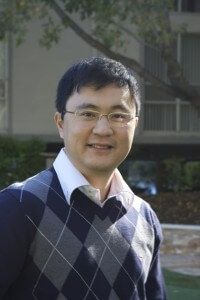Visitor Program

Professor Lin Zhang, Tsinghua University, China
Sponsored: Spring 2012
Host: Bhaskar Krishnamachari
Dr. Lin Zhang visiting USC March 5 – April 4, 2012
Prof. Lin Zhang from Tsinghua University, the top engineering school in China, is visiting USC from March 4 - April 4 2012. A Ming Hsieh Institute-sponsored visitor, he will give a short series of talks focusing both on his research activities and on EE-related education and research in China. Lin Zhang is a researcher in the area of wireless networks including vehicular and sensor networks. He is best known for deploying one of the first sensor network deployments at the Nest Stadium main site of the 2008 Beijing Olympics. Prof. Zhang is currently on a one-year sabbatical as a Visiting Associate Professor at Stanford University, and is working on a book on Information Theory in Chinese.
Biography:
Lin Zhang received all his degrees from Tsinghua University in Beijing (B.Sc. '98, M.Sc. '01, Ph.D. '06) and is currently an associate professor at Tsinghua University and a visiting associate professor at Stanford University. His current research focuses on wireless sensor networks, distributed data processing, and information theory. He is a co-author of more than 40 peer-reviewed technical papers and five U.S. or Chinese patents applications. Lin and his team were also the winner of IEEE/ACM SenSys 2010 Best Demo Awards.
In 2006 Lin led a 2008 Beijing Olympic Stadium (the "Bird's Nest”) structural security surveillance project, which deployed more than 400 multi-hop wireless temperature and tension sensor nodes across the stadium's steel support structure and dome. The system adopted a flexible spectrum sensing and adaptive multi-hop routing algorithm to overcome strong radio interference and long-distance transmission channel-fading, and played a critical role in the construction of the stadium. Since then he has implemented wireless sensor networks in a wide range of application scenarios, including underground mine security, precision agriculture, and industrial monitoring.
Since 2008 Lin has been working in close association with CISCO to develop a Metropolitan Area Sensing and Operating Network (MASON). MASON provides a smart-city and intelligent-urbanization sensor network system for metropolitan areas. MASON has attracted the interest of several large-sized Chinese cities, including Beijing, Shenzhen, Tianjing, and Chengdu. Recently he also has led two National Science Foundation of China projects, three National High-Tech Developing (863) projects, and more than 10 research projects funded primarily by private industry in the area of wireless sensor networks.
At Tsinghua University Lin has been happily teaching Selected Topics in Communication Networks (40230992) and Information Theory (70230063) to upper-level undergraduate and graduate students, respectively, for the past years. In 2004 he received an Excellent Teacher Award from Tsinghua University.
Published on August 16th, 2017
Last updated on February 12th, 2020

